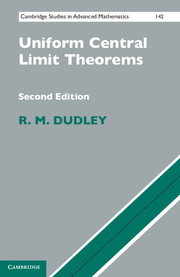Book contents
- Frontmatter
- Dedication
- Contents
- Preface to the Second Edition
- 1 Donsker's Theorem and Inequalities
- 2 Gaussian Processes; Sample Continuity
- 3 Definition of Donsker Classes
- 4 Vapnik–Červonenkis Combinatorics
- 5 Measurability
- 6 Limit Theorems for VC-Type Classes
- 7 Metric Entropy with Bracketing
- 8 Approximation of Functions and Sets
- 9 Two Samples and the Bootstrap
- 10 Uniform and Universal Limit Theorems
- 11 Classes Too Large to Be Donsker
- Appendices
- Bibliography
- Notation Index
- Author Index
- Subject Index
5 - Measurability
Published online by Cambridge University Press: 05 June 2014
- Frontmatter
- Dedication
- Contents
- Preface to the Second Edition
- 1 Donsker's Theorem and Inequalities
- 2 Gaussian Processes; Sample Continuity
- 3 Definition of Donsker Classes
- 4 Vapnik–Červonenkis Combinatorics
- 5 Measurability
- 6 Limit Theorems for VC-Type Classes
- 7 Metric Entropy with Bracketing
- 8 Approximation of Functions and Sets
- 9 Two Samples and the Bootstrap
- 10 Uniform and Universal Limit Theorems
- 11 Classes Too Large to Be Donsker
- Appendices
- Bibliography
- Notation Index
- Author Index
- Subject Index
Summary
The example after Theorem 3.2 showed that for a continuous distribution function F such as for U[0, 1], the set of all possible functions √n(Fn − F), even for n = 1, is nonseparable in the sup norm, and all its subsets are closed, including those corresponding to nonmeasurable sets of possible values of the observation X1. Therefore, the classical definition of convergence in law, or weak convergence, which works in separable metric spaces, does not work in this case, So, in Chapter 3, functions f* and upper expectations E* were used to get around measurability problems.
But, in the classical Glivenko–Cantelli theorem, saying that supx |(Fn − F)(x)| → 0 almost surely as n → ∞ for any distribution function F on ℝ and its empirical distribution functions Fn (RAP, Theorem 11.4.2), there is no measurability problem. The supremum is measurable, as it can be restricted to rational x by right-continuity of Fn and F. The collection C of left half-lines (−∞, x] is linearly ordered by inclusion and so has S(C) = 1, and for it, not only the Glivenko–Cantelli theorem but, after suitable formulations (Theorem 1.8 or, less specifically, Chapter 3), the uniform central limit theorem (Donsker property) holds for any probability measure P on the Borel sets of ℝ.
- Type
- Chapter
- Information
- Uniform Central Limit Theorems , pp. 213 - 238Publisher: Cambridge University PressPrint publication year: 2014



